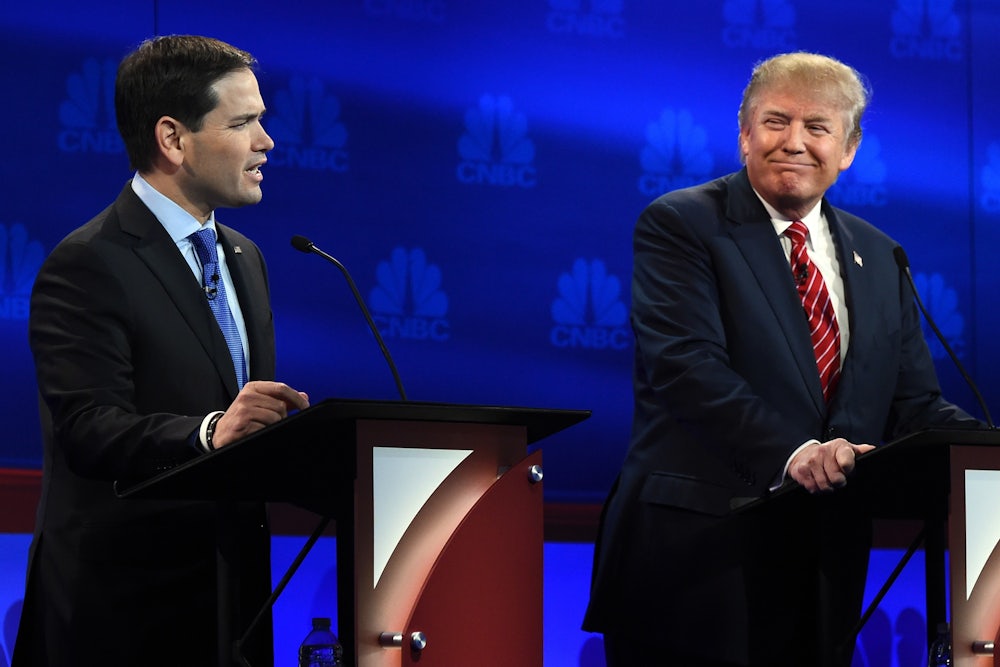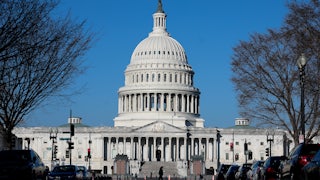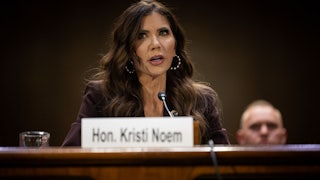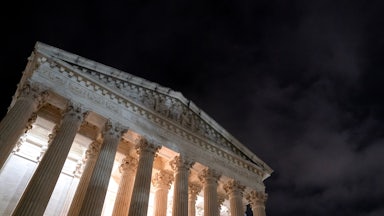Things are looking rosy for Donald Trump.
That’s not what you’d expect to hear about a presidential candidate who is on trial as we speak and soon could be convicted of multiple felonies. Or whose presidential campaign just put out a video referring to a “unified Reich” if he’s elected. Or whose company just announced a $330 million loss, with no path to profitability in sight. Or who still has three more criminal trials to go—one pertaining to his failed coup after the last election, no less.
And yet, it’s undeniable that he’s well positioned to win in November. The man who left office with a historically low approval rating is, per most polls, either leading or narrowly trailing in every swing state, while also leading Joe Biden in the popular vote. Trump has made significant gains with both young people and people of color. And his campaign has begun to close the fundraising gap, outraising Biden for the first time in April. Aside from the looming possibility of becoming a convicted felon, it’s good to be Trump.
So why the hell can’t he seem to find a running mate?
When Trump selected Mike Pence as his vice president in 2016, they were both in a position of weakness. Trump was wildly unpopular, faced long odds against Hillary Clinton, and had just come out of a bruising primary and needed to appease conservatives who were (rightly) skeptical of his credentials. Pence, meanwhile, was a scandal-plagued governor who seemed to be on the verge of losing reelection in deep red Indiana. Their union was one of desperation.
As Trump, the former Apprentice host, endlessly teases his vice presidential shortlist, he is operating from a position of strength for perhaps the first time in his political career. He’s winning the presidential race. He has bent the Republican Party to his will and has a number of acolytes and devotees willing to accept what is, in normal circumstances, the most humiliating job in politics: being his vice president. (Just ask Pence. As thanks for Pence’s four years of thankless service to him, Trump endorsed the idea of hanging him.)
On closer inspection, however, Trump’s vice presidential shortlist hardly suggests a soaring campaign. Instead, it reveals his many, many vulnerabilities—and a candidate as hell-bent on self-destruction as ever.
Per a Bloomberg report from earlier this month, Trump is currently seriously considering four candidates to be his vice president: Senators J.D. Vance, Marco Rubio, and Tim Scott, and North Dakota Governor Doug Burgum.
The first thing you will notice about that list is that they are all men. The second thing is that they are all very conservative men. They are all anti-abortion zealots—Trump’s weakest issue heading into the 2024 election, given his longtime struggles with women voters and his proud status as the person responsible for the end of Roe v. Wade. Last spring, Burgum signed into law one of the strictest abortion bans in the country.
It’s not entirely clear what any of them adds to the ticket. Rubio, who is Cuban American, and Scott, who is Black, would theoretically add to Trump’s apparent growing popularity with nonwhite voters—but that’s just a theory. Both have run (terrible) presidential campaigns before, and there was no sense that either broke through with minority voters (or any voters, for that matter). Scott’s sunny demeanor is appealing, at least until he speaks for more than a minute and you realize he’s a religious extremist. Rubio, once touted as the GOP’s Obama, is still suffering reputational damage from Trump’s excoriation of him nearly a decade ago. Vance is a political opportunist with little experience and no larger appeal beyond weird, lonely men who spend all of their time on the internet—a constituency Trump already has locked up. Bergum is probably the safest pick here, but only because no one has any idea who he is.
The conventional wisdom in recent months is that Trump has benefited by running a more disciplined, moderate campaign than he did in 2016 and 2020. But this idea beggars belief when you take a cursory look at the week’s news. Not only did his campaign post an ad featuring the words “unified Reich,” but Trump has also mused about banning birth control, broken a pledge to testify at his own trial, and spent most of his time in front of cameras ranting about the judge overseeing that trial. Trump’s middle-of-the night social media rants don’t get the coverage that they did in past election cycles, but that’s likely because the press has become more disciplined. Trump remains as unhinged as ever.
And every single person on the veep shortlist would only make Trump seem more extreme, whether it be on economic policy, foreign policy, or abortion policy. Many of the other people he is reportedly considering—Tom Cotton, Ron DeSantis, Byron Donalds—fit the bill. But if Trump were truly running a more moderate or disciplined campaign, he would consider nominating a woman.
Nikki Haley has consistently performed well in GOP primaries despite dropping out of the race in early March—a signal that even many Republicans would love a nominee other than Trump. Selecting her would help unite the party, but Trump won’t do it because she was mean to him. Alabama Senator Katie Britt has the benefit of being a blank slate, or at least she was until her widely mocked rebuttal to Biden’s State of the Union (then again, how many voters watch SNL anymore?). It’s not entirely clear why Trump hasn’t put New York representative Elise Stefanik on his shortlist—though one suspects it has something to do with the fact that she was a fierce critic of his during his first presidential run (before becoming a slavish loyalist). She too is widely unknown, but would help Trump appear more moderate while also bringing along her own culture-war bona fides—namely from the House antisemitism hearings that led two university presidents to lose their jobs.
Instead, Trump will likely choose a male lackey as his running mate, an extremist with little appeal outside of the most fervent corners of his own base. Panic over Biden’s abysmal poll numbers are justified, but Trump’s vice presidential shortlist is a glimmer of hope. He hasn’t had to make very many big decisions during this election. He sat out the primary, often in a courtroom. Soon, he’ll have no choice but to start making critical decisions that remind voters who he really is.






